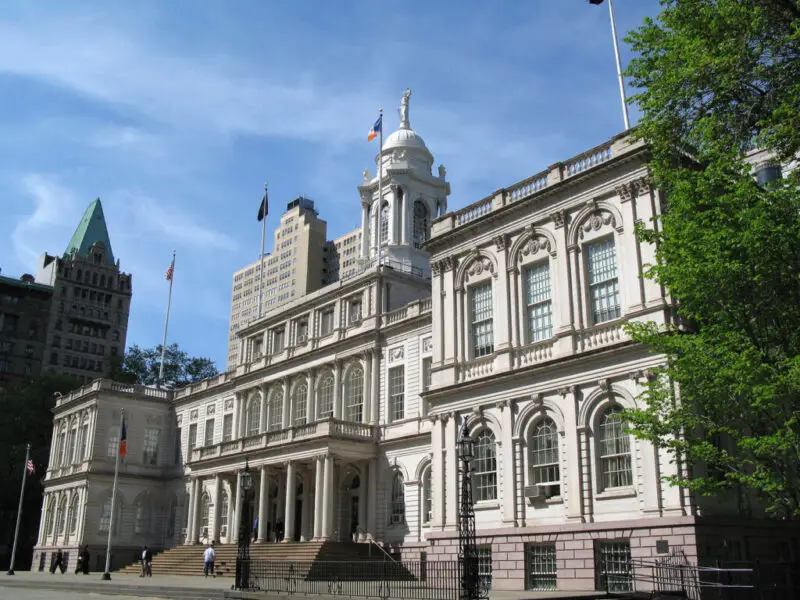Working in city government in New York isn’t like landing a typical 9-to-5. It means stepping into one of the largest and most complex municipal systems in the world, with a budget bigger than some countries and over 120 agencies that serve more than 8.5 million residents every single day.
If you’re wondering what it takes to get one of these jobs, here’s the short answer:
- You’ll need to meet minimum qualifications (which vary by role),
- Often pass a competitive civil service exam,
- Navigate a slow but structured hiring process,
And be ready to work within a highly regulated system shaped by unions, seniority, and long-standing procedures.
As of 2023, over 330,000 employees work for the City of New York. This includes teachers, sanitation workers, analysts, IT professionals, urban planners, social workers, and thousands more.
These jobs offer excellent benefits, strong job security, and clear promotion paths, but they also come with bureaucracy, long waits between application and hire, and often outdated internal systems.
NYC City Government by the Numbers
Before we dive into qualifications and hiring logistics, here’s what we’re dealing with:
- Over 330,000 people work for the City of New York (2023 data from NYC OMB).
- The city operates over 120 agencies, covering everything from police and fire to cultural affairs and public health.
- NYC’s FY2025 budget is over $112 billion — more than the entire budget of some U.S. states.
- The Department of Education alone employs more than 135,000 workers.
- The Department of Sanitation has 9,500+ uniformed employees.
- The NYPD employs approximately 36,000 uniformed officers and 19,000 civilians.
The scale is massive. But so is the bureaucracy.
Minimum Qualifications: What You Need to Get In
Working for the City of New York means stepping into a highly structured public employment system—one that emphasizes fairness, transparency, and competitive selection. That structure is largely built on the civil service system, which governs how most positions are filled.
However, not all city jobs follow the same path. Here’s what you need to know about qualifying for a position in NYC government in 2025.
Civil Service Roles: The Standard Pathway
The vast majority of city government jobs in New York fall under the competitive civil service category. This means you must apply to take an officially administered exam, and your score on that test determines your rank on an eligible hiring list.
These exams vary by position and can include multiple-choice tests, practical skills assessments (e.g., typing, Excel), oral interviews, or evaluations based on your education and experience. Exams are scored, and successful candidates are placed on a civil service list.
The hiring process then pulls from this list in rank order, meaning the highest scorers are contacted first when positions open.
To sit for most exams, candidates must meet basic eligibility requirements:
- Be a U.S. citizen (for many titles, especially in law enforcement and emergency management)
- Have at least a high school diploma or GED.
- Be legally authorized to work in the United States.
Applications for exams and job openings are submitted through official portals:
- nyc.gov/jobs
- nyc.gov/dcas (Department of Citywide Administrative Services)
Once your name appears on a civil service list, you may be contacted when agencies have vacancies, but this can take several months, depending on your rank and demand for the role.
Non-Competitive and Exempt Titles
Not all city jobs require an exam. Positions labeled “non-competitive”, “exempt”, or “provisional” may be filled based on qualifications, interviews, or internal promotions. These jobs are often found in specialized fields such as:
- Information technology
- Emergency management
- Health and hospital administration
- Legal support roles
- Communications and media
Because these roles are not bound by civil service testing, hiring is generally fast, r—but also more selective and competitive. Applicants must usually demonstrate substantial experience or highly relevant education. Internal referrals, networking, and prior agency internships can also be key factors in landing these positions.
Education & Certification Requirements
Your educational background and any professional credentials you hold will determine what types of roles you’re eligible for. While some entry-level jobs accept candidates with only a high school diploma, more technical or supervisory roles typically require college degrees and industry-specific licenses.
For professionals looking to advance into leadership roles—especially in areas like city planning, budgeting, policy analysis, or department management—a graduate degree can be a major asset. Many current and aspiring city employees pursue public administration master’s programs to gain the skills needed for upper-tier civil service roles.
These programs focus on government operations, organizational leadership, budgeting, ethics, and urban policy, offering the kind of foundation that directly applies to New York City’s complex government structure.
Here’s a breakdown of common job categories and their typical qualifications:
| Job Category | Required Education/Certification |
| Clerical & Administrative | High school diploma or GED |
| Inspectors & Analysts | Bachelor’s degree (often in criminal justice, business, or public admin) + relevant experience |
| Social Workers | Master of Social Work (MSW) + New York State licensing (LMSW or LCSW) |
| Engineers & Planners | Bachelor’s or Master’s in civil engineering, urban planning, or architecture + NYS Professional Engineer (PE) license (or working toward it) |
| IT Specialists | BA in Computer Science, Information Systems, or equivalent experience with enterprise systems, software development, or cybersecurity |
| Public Health Professionals | Bachelor’s or Master’s in Public Health, Nursing, Epidemiology, or related fields + state licensure (where applicable) |
The Hiring Process (Step by Step)
- Find an Open Position – Check DCAS and individual agency websites. Jobs open and close quickly. Bookmark roles and read the Notice of Examination (NOE) or job description closely.
- Apply Online – Use the NYC Jobs Portal. For exam titles, apply and pay the test fee (usually ~$68–$101).
- Take the Civil Service Exam – Prep is essential. You can buy guides or enroll in test prep programs. Scores are weighted heavily.
- Wait for the Eligible List – After the exam, it may take months to a year to be officially listed.
- Interview (if called) – Once your list number is reached, agencies will call you for interviews and background checks.
- Medical/Background Screening – Some jobs (e.g., sanitation, corrections, and NYPD) require drug tests, psychological assessments, and full background checks.
- Appointment & Probation – Most hires start with a 1-year probationary period.
Salaries and Benefits: What You Make
Base Salaries (2024–2025 estimates):
| Role | Salary Range (Annual) |
| Clerical/Administrative | $33,000 – $55,000 |
| Analyst/Planner | $55,000 – $85,000 |
| Sanitation Worker | $44,000 starting → $89,000* |
| Police Officer (NYPD) | $42,500 starting → $99,000 |
| Teacher (DOE) | $61,070 starting → $128,657 |
| IT Professional | $60,000 – $120,000+ |
Benefits (usually excellent):
- NYC Health Benefits Program: Includes medical, dental, and vision
- Pension (NYCERS or TRS): Defined-benefit plan
- Union Representation: Almost all roles are unionized
- Paid Vacation: Up to 27 days after 15 years
- Paid Sick Leave: Usually 12+ days/year
- Loan Forgiveness: Many roles qualify under PSLF
As New York City continues to recover from the pandemic, modernize its infrastructure, and invest in public safety, housing, health, and data systems, certain roles are seeing a sharp increase in demand. These positions are more accessible to external candidates, including private-sector professionals and recent graduates.
Here are the top growth roles in 2025 and the city agencies leading the charge in hiring:
| Role | Why It’s in Demand | Key Hiring Agencies |
| Cybersecurity Analysts | Increased digital threats have pushed NYC Cyber Command to expand security operations | NYC Cyber Command (C3), OTI |
| Public Health Inspectors | Post-COVID focus on environmental health, food safety, and disease control | DOHMH, DEP |
| Data Analysts & GIS Specialists | City planning, housing, policing, and transit increasingly rely on data-driven tools | DOT, HPD, NYPD, DCP |
| Affordable Housing Project Managers | Ongoing housing crisis and new developments under the Housing New York initiative | HPD, HDC, NYCHA |
| Transit & Climate Planners | Investments in resiliency and sustainable mobility drive planning demand | DOT, Mayor’s Office of Resiliency |
| Social Workers & Case Managers | Demand surging in child welfare, homeless services, and mental health outreach | ACS, HRA, DHS, DOHMH |
| IT Project Managers | Tech modernization across agencies requires experienced project leadership | OTI, H+H, Finance, DOE |
DOHMH (Health), DOT (Transportation), HPD (Housing), NYCHA (Housing Authority), and OTI (Technology & Innovation).
These roles not only offer competitive salaries and benefits but also meaningful opportunities to contribute to the city’s long-term growth and equity goals. They’re ideal for candidates looking to bring their private-sector expertise into the public sphere.
The public transportation is quite good in New York, so you won’t need to worry about getting to work on time. If metro is not an option for you, bus lines are also frequent. For example, if you are working at the New York City Office at 10601 Avenue and live in Prospect Lefferts Gardens, you can use the B12 Bus.
Final Thoughts
Getting a job in city government in New York isn’t a fast process, and it’s not simple. But if you’re serious about long-term stability, real civic impact, and a career where the scale of your work truly matters, it’s worth the effort.
From sanitation trucks in Staten Island to planning climate resilience in Lower Manhattan, city employees keep the city running. If you want in, know that it takes patience, preparation, and persistence—but the payoff is real.






